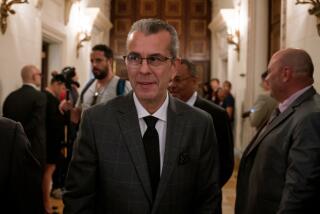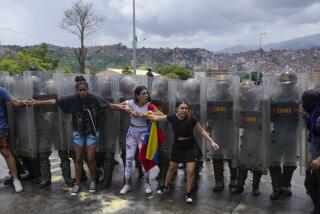Rival Will Accept Afghan Outcome
- Share via
KABUL, Afghanistan — Presidential candidate Younis Qanooni, the chief rival of incumbent Hamid Karzai, agreed Monday to drop his protest of Afghanistan’s landmark elections and accept a U.N. panel’s verdict on whether there were substantial irregularities in the vote.
Qanooni was among 15 candidates who said they would reject the results of Saturday’s election because they claimed it was marred by widespread fraud. But in a meeting with U.S. Ambassador Zalmay Khalilzad on Monday, Qanooni agreed to accept the findings of a three-member United Nations commission that will investigate the allegations.
“To respect the will of millions of Afghans, and to go along with our national interests, I will accept the results of the elections after the investigation is launched,” Qanooni told reporters.
Abdul Latif Pedram, another leading candidate, accused Qanooni of caving in to U.S. pressure and breaking ranks with the other candidates in exchange for a role in a new government, expected to be led by Karzai.
“Mr. Qanooni hasn’t announced that he is going to switch sides yet, but from the reports that we have from sources inside the meeting today, it looks as if Qanooni is going to switch sides and drop out as a candidate,” Pedram said. “We have very good proof for this.”
Qanooni, who previously served as education minister under Karzai, denied he had made any deal.
“No one has offered me a post and I have never spoken about it with anyone,” he said. “And I have never demanded such a thing.”
Millions of Afghans defied extremists’ threats of violence and voted Saturday in the country’s first election for president. The vote was largely peaceful. But some people may have been able to cast more than one ballot because, in some polling stations, the ink that was supposed to be indelible and applied to voters’ thumbs to prevent repeat voting easily rubbed off or was not used.
Opposition candidates also charged that local police and election officials in rural areas were instructing illiterate voters to mark their ballots for Karzai.
“People came out to vote, not to see fake activities and fraud, but to see the truth,” Qanooni repeated Monday. “And unfortunately they saw fake activities and fraud, like the ink problem. Illiterate people were deceived to vote [for] someone who they didn’t want to vote [for].”
The U.N. named Canadian diplomat Craig Jenness and Swedish election administration specialist Staffan Darnolf to the investigating commission Monday. The European Union will nominate the third member.
The joint Afghan-U.N. body that organized the election has told investigators to focus first on issues that may require a specific ballot box to be set aside as vote counters work on other ballot boxes.
“This will allow the two exercises -- counting and investigation -- to proceed simultaneously,” the election organizing body said in a statement.
The joint body will issue a final statement on the election results once it reviews the unofficial count and the panel’s report on the investigation, which will also be made public. The ballot counting is expected to last a few weeks, but a trend is likely to emerge by the end of next week.
After Saturday’s boycott call, foreign observers said there were not sufficient irregularities to invalidate the election. There were only 230 foreign monitors to watch 5,000 polling stations. The monitors were restricted mainly to cities because of fears of violence in the countryside, where the majority of fraud and intimidation allegations were raised.
But foreign monitors have “carefully received testimony from people who were not in the cities,” said Francesc Vendrell, the European Union’s special envoy to Afghanistan.
“I am not prone to call a black cat white,” he told reporters. “We literally went trying to search for evidence of intimidation and violence. We found very little indeed.
“I’m not saying that we found everything -- most likely not. But what I think is the case is that most people were able to cast their votes freely, and therefore to choose the person that they want to be their president for the coming five years.”
Mohammed Mohaqiq, an ethnic Hazara leader, was among the first to publicly call for an investigating commission. He said Monday that the three-member U.N. panel was not good enough.
Mohaqiq, who said days before the vote that the U.S. ambassador had tried to persuade him to drop out in favor of Karzai, said he met again with Khalilzad and the British ambassador to discuss the probe into the fraud allegations.
A Western diplomatic source confirmed that the ambassadors met with Mohaqiq on Sunday and said talks would continue.
“The ambassador has met with candidates over the past two days to discuss the investigation,” U.S. Embassy spokeswoman Elizabeth Lee said. “Regarding the future Afghan government, those decisions will be made by the next elected president.”
Pedram also rejected the U.N. investigating team, which he said “will never bring any kind of change.”
“I and my party, we are all standing on what we said and we don’t agree with this commission and we don’t accept the results of these elections,” Pedram said. “The things that happened on election day -- they were very harmful. And they were really big crimes that a commission cannot solve.”
More to Read
Sign up for Essential California
The most important California stories and recommendations in your inbox every morning.
You may occasionally receive promotional content from the Los Angeles Times.










